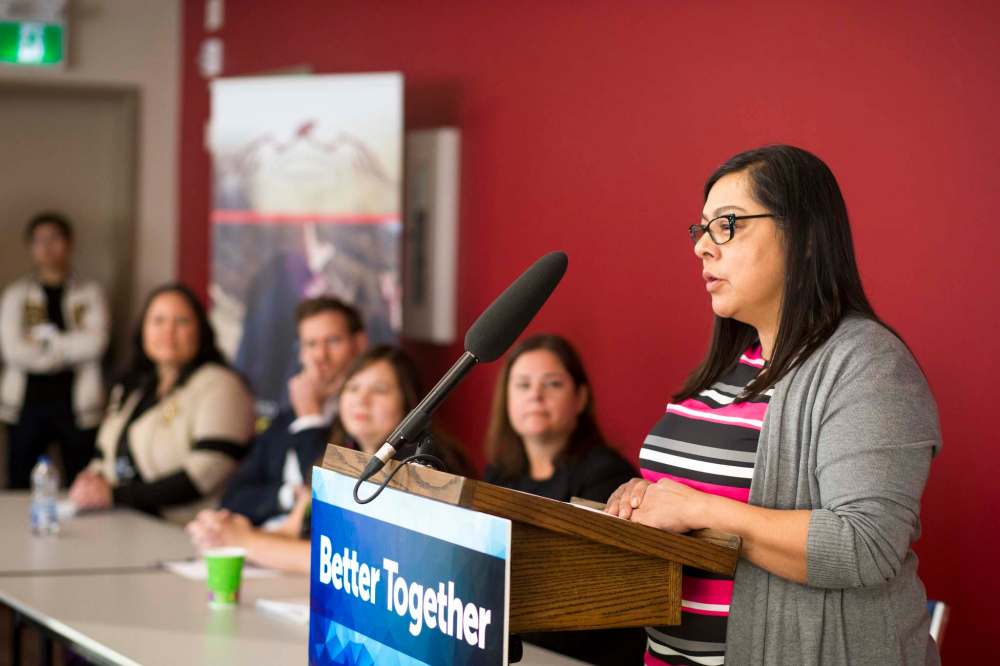Province, CFS join forces, seek investment in program to reduce Indigenous kids in care
Advertisement
Read this article for free:
or
Already have an account? Log in here »
To continue reading, please subscribe:
Monthly Digital Subscription
$19 $0 for the first 4 weeks*
- Enjoy unlimited reading on winnipegfreepress.com
- Read the E-Edition, our digital replica newspaper
- Access News Break, our award-winning app
- Play interactive puzzles
*No charge for 4 weeks then billed as $19 every four weeks (new subscribers and qualified returning subscribers only). Cancel anytime.
Read unlimited articles for free today:
or
Already have an account? Log in here »
Hey there, time traveller!
This article was published 06/01/2019 (2083 days ago), so information in it may no longer be current.
The province and Child and Family Services agencies are seeking private investors to finance a pilot project aimed at reducing child apprehensions.
The two-year project will match doulas with Indigenous mothers who are at risk of having their infants apprehended by the Manitoba child-welfare system.
“The Indigenous doulas will support those mothers through pregnancy, birth and the first months of their children’s lives,” said Tara Petti, chief executive officer of the Southern First Nations Network of Care.

Doulas — also known as birth companions, birth coaches or post-birth supporters — are non-medical individuals who assist women before, during or after childbirth to provide emotional support and physical help, if needed.
The pilot will support up to 200 at-risk expectant mothers. SFNNC will lead the project and work with the doula service provider, Wiijii’idiwag Ikwewag, to identify expectant mothers who may not have the resources to effectively parent their babies.
The funding mechanism used to support the project is called a social impact bond. Private-sector investors will make a return on their investment only if the program achieves targeted outcomes that are validated through a third party. The province has budgeted $3 million for the project.
Natalie Daniels, CFS liaison with the Southern Chiefs’ Organization, described the initiative as a “historic, landmark event” at a news conference Monday in Headingley attended by Families Minister Heather Stefanson and several other dignitaries.
“I would say that what has happened in the past hasn’t necessarily worked,” Stefanson said. “I think we need to find new and innovative ways. And I think through the social impact bond we can do that to provide better outcomes for Manitoba families.”
The project’s success will be measured on the basis of reduced days in care for children enrolled in the program, compared with a comparable group outside of it. If the project goes as planned, investors will receive a return of 4.1 per cent. Returns could go as high as 5.5 per cent, but investors also risk losing their money if the program fails.
“We will identify and take referrals of expectant mothers across southern Manitoba and connect them with a doula to provide support before, during and after the birth of her child for up to one year,” said Jolene Mercer, team member with Wiijii’idiwag Ikwewag. “Part of the process will help the mother reconnect with traditional cultural practices and strengthen her support system.”
Mercer said the services provided by Indigenous doulas will be more extensive than by mainstream practitioners.
Whereas a mainstream doula may do four visits (including prenatal and post-delivery), the Indigenous doulas working with at-risk families are likely to make about 15 visits, depending on the mothers’ needs, she said.
The province is working with a Toronto-based consultant, the MaRS Centre for Impact Investing, in developing the social impact bond. It is the first of its kind to be launched in Manitoba, and the government says it plans to launch SIBs in other areas.
Jesse Hajer, who teaches economics and labour studies at the University of Manitoba, said the initiative announced Monday seems to be a great project to deal with a pressing social issue. However, he questions whether the SIB model is the best way to tackle it.
Hajer, who has researched social impact bonds in other jurisdictions, said the government could likely offer the service itself for less money. The question is how much extra value will the announced delivery model add, he said.
While the stated return on investment for the doula project is relatively modest — in some jurisdictions returns for SIBs are in the double-digits — Hajer wonders how much of a risk investors are taking in this case. He noted the Winnipeg Boldness Project already piloted a similar doula program in Point Douglas.
larry.kusch@freepress.mb.ca

Larry Kusch
Legislature reporter
Larry Kusch didn’t know what he wanted to do with his life until he attended a high school newspaper editor’s workshop in Regina in the summer of 1969 and listened to a university student speak glowingly about the journalism program at Carleton University in Ottawa.
Our newsroom depends on a growing audience of readers to power our journalism. If you are not a paid reader, please consider becoming a subscriber.
Our newsroom depends on its audience of readers to power our journalism. Thank you for your support.
History
Updated on Monday, January 7, 2019 5:15 PM CST: Full write through



